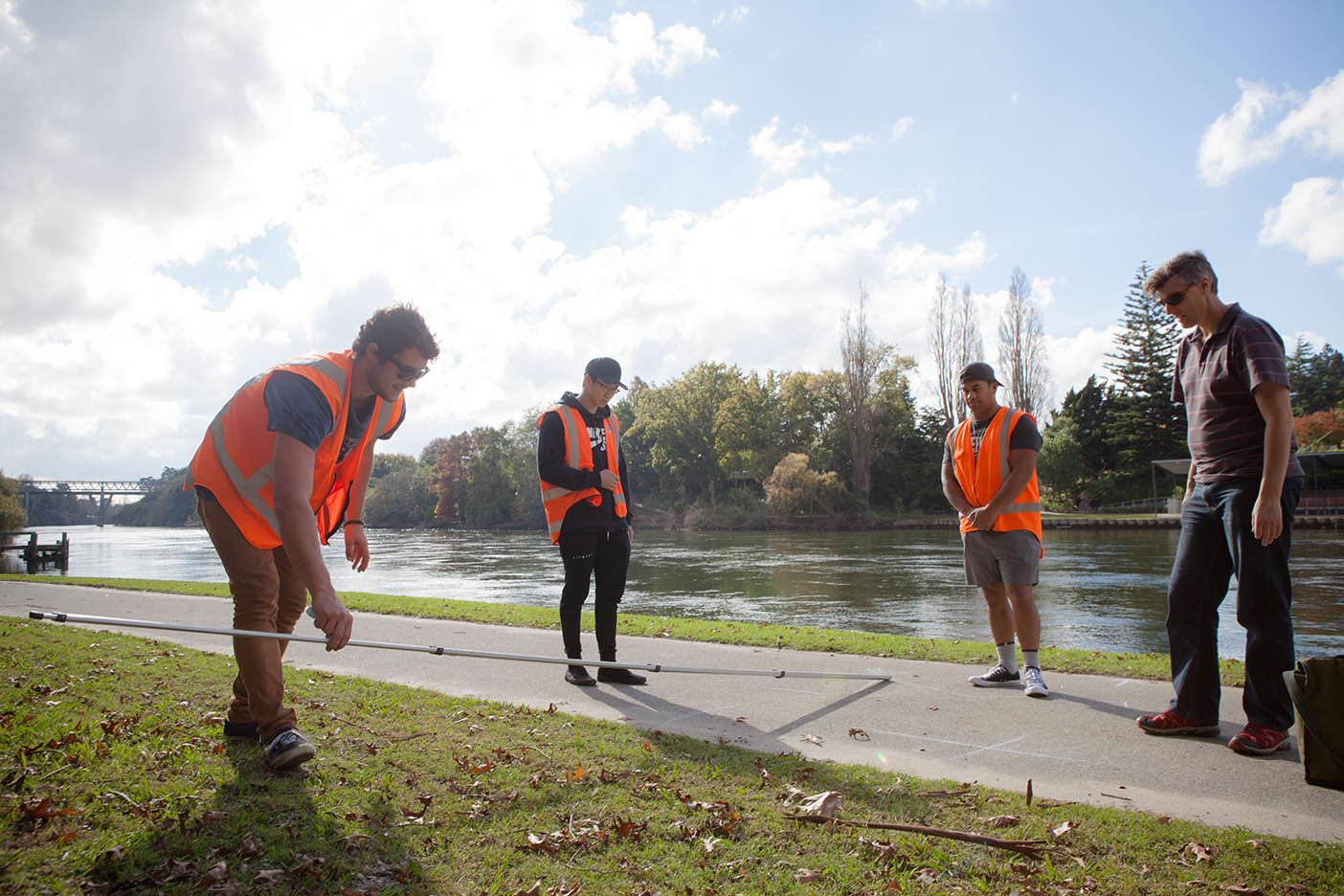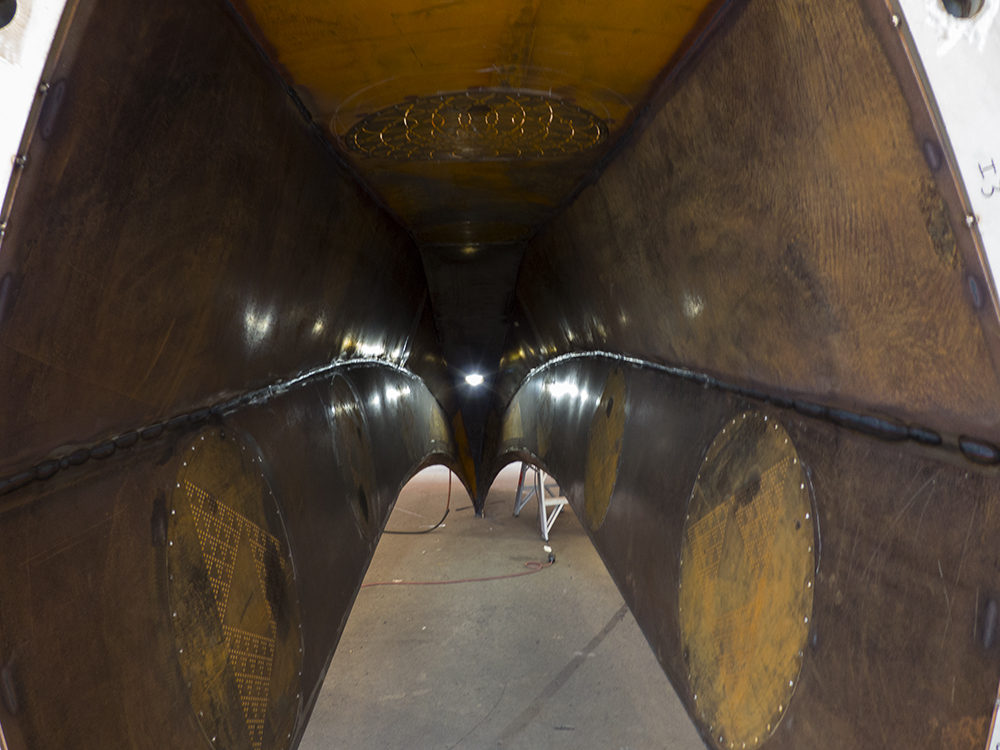Waka sculpture installation announced for Hamilton’s Ferrybank Reserve

Artist’s impression of Tōia Mai, Hamilton’s new interactive waka sculpture by Wintec Media Arts Honours student Juliann Smith.
The date is set for the installation of Hamilton’s newest public sculpture, Tōia Mai which tells the Matariki story and symbolises the cultural, spiritual and economic significance of the Waikato River.
Work has begun to install Tōia Mai, a 6.8m tall interactive sculpture, the result of the Matariki Interactive Waka Project led by artist and Wintec tutor Joe Citizen, before it is gifted to the people of Hamilton on 23 November 2018.
The project which Joe describes as “for the people, by the people” has been developed over the past 18 months. It is the result of collaborative partnerships between the artist, Wintec Māori Achievement team, Wintec staff and students, local industries, Hamilton City Council, researchers and mana whenua under the guidance of Wintec kaumātua Tame Pokaia.
“It has been a positive learning experience that has been at times testing and jubilant and I can’t believe we have finally got to this point” says Joe, now the first sods have been turned on the Ferrybank Reserve site.
This week, Wintec kaumātua Tame Pokaia gave the sculpture its name.
“The name, Tōia Mai refers to a call to action, pulling or working together with a unity of purpose. It highlights the many skills people bring to this project and will continue to do so, to preserve its longevity,” he says.
Wintec director Māori Hera White says the project has involved a large number of students studying Māori and Pasifika Trade Training (MPTT), IT, engineering, design and music alongside Joe Citizen, Wintec’s Māori Achievement team and industry partners.
“This project aligns with Wintec’s focus to encourage our students to be successful, through giving them real world experiences, cultural support and identity. It has also achieved results by ultilising their skills across a range of study disciplines,” says Hera.
“The learning for our students doesn’t stop when the sculpture is installed on its river site. Through a continued online presence and student-created phone apps, it will continue to enable future learning for students and the wider public alike.”
Striking a balancing between culture, history and technology, Tōia Mai is informed by an Internet of Things network aligned to the seven stars of Matariki, a taonga puoro informed soundtrack and interactive lighting which will respond to environmental, seasonal, and lunar changes, as well as people’s movements.
The sculpture is in its final stages of production with project partner, Longveld Ltd, a Hamilton engineering firm where a number of Wintec’s MPTT students have been mentored and guided.
Joe says that through this project, Longveld staff have encouraged students to develop their understanding of te ao Māori values, while also providing real-world experience and industry-ready skills.
Mentorship and in-kind support have been provided by project partners Longveld and Hamilton City Council and supporters ACLX, Aware Group, and Mech Eng Ltd, with additional sponsorship and grants received from the Brain Perry Charitable Trust, Trust Waikato, WEL Energy Trust, AUT University, DV Bryant Trust, and Creative New Zealand. Further student mentorship for the taonga puoro informed sound-tracks is provided by renowned Māori music practitioner Horomona Horo.
Tōia Mai will be officially gifted to the people at a public event on the afternoon of Friday 23 November on the Ferrybank Reserve, Hamilton.
 Early days: Wintec civil engineering students with Joe Citizen mark out the Ferrybank Reserve site.
Early days: Wintec civil engineering students with Joe Citizen mark out the Ferrybank Reserve site.
 The inside view of the sculpture under construction showing the taniko patterns.
The inside view of the sculpture under construction showing the taniko patterns.
About the sculpture
Tōia Maiis made from corten plate steel and features niho taniwha a Waikato pattern and reference to a proverb describing the many chiefs and villages along the Waikato River and a taniko pattern taken from the kaitaka or fine cloak belonging to King Tāwhiao*. While the sculpture has been built using modern materials and technology it was inspired by the story of Te Winika, the last surviving waka from the 1860’s land wars and what it represents as an icon of cultural and historical significance for the Waikato river and its people.
*King Tāwhiao was the second Māori King and a religious visionary. He was a member of the Ngāti Mahuta iwi of Waikato.
Read more:
Māori culture meets IT to tell waka story
Engineering firm takes mentoring to another level.
Support builds for Hamilton's Interactive Waka Sculpture.
